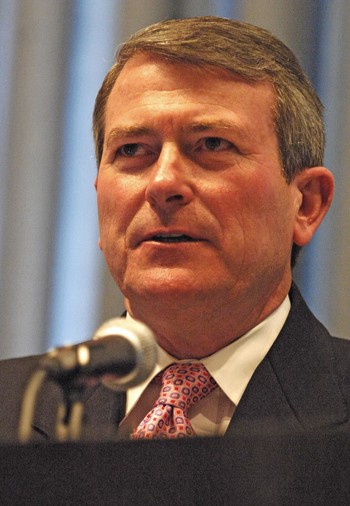
Belo Distinguished Chair of Journalism Tony Pederson. (Stuart Palley)
Belo Distinguished Chair of Journalism Tony Pederson was the featured speaker at the Cary M. Maguire Center for Ethics and Public Responsibility’s bi-annual Maguire Public Scholar Lecture in the Umphrey Lee Ballroom Wednesday.
Pederson focused his lecture on the concept of reporter’s privilege, the idea that reporters have a right to keep their sources for articles and television segments anonymous, even to the government.
After a brief introduction by Maguire Center Director Thomas Mayo and a roundup of Pederson’s impressive credentials by history professor Glenn Linden, Pederson began by citing the past usage of investigative journalism and the ‘reporter’s privilege’, and how things stand now as compared to over 50 years ago.
“Things change,” Pederson said. “When it comes to journalism, the rules change sometimes.”
Pederson cited numerous recent examples of court cases over whether reporter’s privilege actually can legally exist in America without violating the Constitution and defying the government. Cases such as the CIA leak story in which The New York Times reporter Judith Miller was jailed for 85 days for not giving the name of her source (later found to be Dick Cheney’s Chief of Staff Scooter Libby) were prominently discussed. In addition to Miller’s imprisonment, former TIME Magazine reporter Matt Cooper was also called in and testified only after receiving a notice that he was no longer required to keep his source’s name a secret.
Another case discussed was the Barry Bonds steroid abuse scandal and its relation to steroid supplier BALCO. San Francisco Chronicle writers Lance Williams and Mark Fainaru-Wada discovered doping abuses involving numerous athletes from runner Marion Jones to baseball slugger Jason Giambi during this investigation, but they nearly faced 18 months in jail for refusing to cite their sources to a federal grand jury. It was only when attorney Troy Ellerman pleaded guilty to leaking the information among other charges that they were let off the hook.
“Is there or is there not some sort of right to…keep sources confidential from the face of subpoenas?” Pederson said.
Pederson then went to talk about the properties of the shield law, a law in some states that allows news reporters the right to refuse to testify about information gained from anonymous sources and to keep sources’ identities to themselves. After offering a brief examination of reasons why a Federal shield law has not yet been passed (citing problems involving the First Amendment, journalistic protection and the ever-changing legislative body as examples), he gave examples of when the first reporter’s privilege cases originated and the need for a national shield law.
The first cases began in the late 1950s, with trials such as Garland v. Torre, a case in which writer Marie Torre was sentenced to 10 days in prison for contempt of court when she refused to give her source for information on why actress and singer Judy Garland was currently out of work. Pederson then went through the ’70s and ’80s, citing examples of when federal judges and Supreme Court Justices had ruled against reporter’s privilege.
Pederson also cited examples from his 20-year tenure as a writer and eventually executive editor and senior vice president of The Houston Chronicle, in which reporters were also jailed for refusing to name their sources for various crime scene investigations across Houston. His final example of anti-journalist bias was freelance writer Vanessa Leggett’s sentence of 168 days in jail for contempt of court in the Houston Court of Appeals. He went on to note that this is the longest time any reporter has spent in jail in national history.
Pederson ended his lecture with a plea for a national shield law to be instated so journalists can report freely without feeling that they are a long branch of the national government. He stated that Texas currently has no shield law itself, and that plans to create a shield law bill are under threat of being vetoed by the current president.
“If we look where we are now, I think we are in sure jeopardy,” Pederson said. “If we start to live with a limited flow of information, it will make for a poor democracy.”








